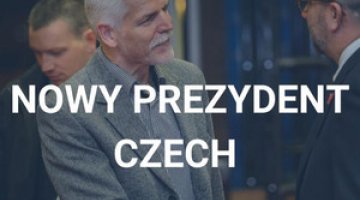The crisis of traditional parties in the Czech Republic
In the snap parliamentary elections scheduled for 25-26 October, an important role may be played by political parties which have hitherto been absent from the Chamber of Deputies. The ANO 2011 movement and the Party of Civic Rights – Zemanovci (SPOZ) are capitalising on the popularity of their leaders. In their electoral campaigns they have been focusing on criticising the compromised right-wing parties and the Czech Social Democratic Party (ČSSD), which is currently leading the opinion polls, while attaching less importance to presenting their political manifestos. Opinion polls indicate that ANO 2011, established by Andrej Babiš, a Czech billionaire of Slovak origin, can expect to gain approximately 10% of the vote. Support for President Milos Zeman is hovering around the 5% threshold.
These parties have been emphasising the need to combat corruption, criticising the alienation of the present political elite and underlining the role of direct democracy. Nevertheless, these parties are managed with a firm hand by the people who have invested money in them, and who have been reluctant towards new members, as such people might push for a more democratic way of managing the party. Contrary to traditional political parties where there is a bottom-up staff rotation, these parties rather resemble political business projects.
A decline in confidence in the traditional parties
The Civic Democratic Party (ODS) and the Czech Social Democratic Party (ČSSD), which have dominated the Czech political scene since the birth of the Czech Republic, have gradually been causing increasing aversion in Czech citizens. Whereas in 2006 the ODS and ČSSD won a joint total of over 3.6 million votes, four years later only 2.2 million people voted for them. In 2010 the conservative TOP 09 and the ephemeral Public Affairs (VV) party entered parliament for the first time. The Party of Civic Rights fell just 40,000 votes short of passing the electoral threshold. TOP 09 and Public Affairs formed a government coalition together with ODS. However, as time passed, it was revealed that Public Affairs more closely resembled a political business project, closely linked with a property protection company, than a political party. The lack of confidence between the coalition partners, which resulted in regular government crises, led to the collapse of the coalition and the loss of its majority in the Chamber of Deputies. Having no support, Public Affairs has decided not to stand in the forthcoming election.
Unlike Public Affairs, TOP 09, which was created five years ago on the basis of a declining Christian Democratic party, is nowadays seen as part of the establishment and will most likely take the place of the ODS as leader of the right-wing bloc. TOP 09 has set itself apart from the ODS and ČSSD as it seeks to build its political position under a new brand, with a promise of a change in political culture, without the burden of earlier scandals. This has been particularly well received by voters from big cities. This was clearly apparent during this year's presidential elections where the TOP 09 leader Karel Schwarzenberg entered the second round together with Milos Zeman, whereas the candidate from the ČSSD gained 16%, and the ODS candidate took the penultimate position with the support of merely 2.5% of the vote.
Andrej Babiš' project – ANO 2011
As for ANO 2011, Andrej Babiš is its leader and de facto owner. The holding he owns, Agrofert, the leading company in the agro-food and chemical industries, makes him the second richest person in the Czech Republic. He employs approximately 27,000 people in about 200 companies in the Czech Republic. In 2011 Babiš established the Action of Dissatisfied Citizens, which he then transformed into a political movement, known as ANO 2011. Agrofert's recent offensive on the media market may help Babiš secure good results in the election, as two popular dailies (Mlada Fronta DNES and Lidove Noviny) and associated internet gateways are now part of his holding. Babiš involved trusted co-workers from Agrofert to work for ANO. Furthermore, Babiš has tried to attract household names to lend credibility to his project. Those who have given up co-operation with Babiš have drawn attention to his authoritarian way of managing the party. As a result, with a few exceptions, there are insufficient people with experience in politics on ANO's electoral lists.
ANO 2011's ideological identity is difficult to define. In the European structures the party's management co-operates with the Alliance of Liberals and Democrats for Europe party (ALDE). ANO's manifesto includes reducing taxes and increasing employment and the effectiveness of the administration. The party presents few clear solutions; its leader contends, however, that the state should be managed like a company. In foreign policy, ANO 2011 opts for the strengthening of European integration, continued participation in external missions and the ‘economisation’ of diplomacy.
Babiš’s critics reproach him for his membership in the communist party and co-operation with the Czech security services, which has allegedly been confirmed by documentation from the Slovak Nation’s Memory Institute. Babiš categorically denies co-operation with the security services, and has tried to clear himself of these charges in Slovak courts. There are also accusations that his political activity is intended to protect Agrofert's business interests. Babiš has publicised his criticism of food imports, mainly from Poland, and is a proponent of strengthening the domestic agro-food industry.
Party of Civic Rights – Zemanovci (SPOZ)
In SPOZ, it is the party's honorary leader, the Czech president Miloš Zeman, and his closest aides who call the shots. Whereas Zeman is unequivocally associated with the political establishment, his closest entourage and the SPOZ management are mainly composed of people who have not had an earlier political career. Some of them are business people who are active in relations with the post-Soviet area.
SPOZ was created in 2009 on the basis of an association which principally grouped Zeman's former political allies. Their main aim was to ensure the former leader's return to politics and thus to create career opportunities for his allies. This task was accomplished in 2013 when Zeman became the Czech president. The involvement of SPOZ and people affiliated with it in Zeman's electoral campaign was rewarded with positions in the Presidential Chancellery for its leaders, and later in the government led by Jiri Rusnok, whom Zeman appointed without approval from the Chamber of Deputies. Another step in the party's plans will be to win seats to parliament.
However, the Czech president's large personal popularity does not simply translate to support for his party, which currently stands at approximately 5%. A serious problem for SPOZ is that the party does not have a strong and recognisable leadership. As its honorary president, Zeman does not conceal his support for SPOZ, but the party's president Zdeněk Štengl is not familiar to the majority of Czechs. Although five ministers in the Rusnok government have been persuaded to stand for the election as candidates on the SPOZ lists, the party lacks popular and trustworthy faces in its electoral campaign. Zeman's people have also been affected by media disputes over the distribution of places on the electoral lists; following one such conflict, Zeman's former closest aide, Miroslav Šlouf, announced that he will leave the party.
SPOZ, which describes itself as a centre-left party, has a manifesto that is almost identical to the president's. It includes anti-corruption measures, reform of the electoral system and a strong emphasis on state investments as a way out of the economic crisis (including the implementation of the Danube-Oder-Elbe project). In foreign policy SPOZ calls for deeper European integration. As far as defence policy is concerned, on the one hand the party is committed to increasing the Czech state’s involvement in fighting terrorism, but on the other hand it proposes further cuts in the defence budget. SPOZ is also focused on co-operation with the armies of the Visegrad Group countries (which is meant to make further savings possible), as well as collaboration with Russia in the construction of the European missile defence system.
Forecasts for the elections
The dispute between the traditional parties which draw on classic ideologies and the new parties is becoming an increasingly clear dividing line in Czech politics. The right-wing parties, which are unlikely to take power following the elections, have categorically ruled out post-election co-operation with ANO 2011. The opinion polls leader ČSSD is in a different situation, as there is a dispute within the party over the model of the relations it should have with President Zeman, who used to be the party's leader for many years. For the ČSSD a coalition with SPOZ would mean strengthening co-operation with the Czech president, and thus weakening the influence of the party’s leadership. As in such a situation Zeman would become the left-wing's natural leader. Given this, an alliance with ANO 2011 would be an attractive solution for the ČSSD because it would allow Social Democrats to emancipate themselves from the Czech president. However, ANO 2011's lack of ideological content, of political experience of its candidates, and a possible conflict of interests between Andrej Babiš' companies and the government's policies may prove risky for the ČSSD. Similar problems have made it impossible for the right-wing parties to continue their co-operation with Public Affairs. However, it cannot be ruled out that the ČSSD will establish co-operation with Babiš' party, even more so if the Christian and Democratic Union-Czechoslovak People's Party (KDU-ČSL) do not return to the Chamber of Deputies, and negotiations with the Communist Party of Bohemia and Moravia (KSČM) prove too difficult.




